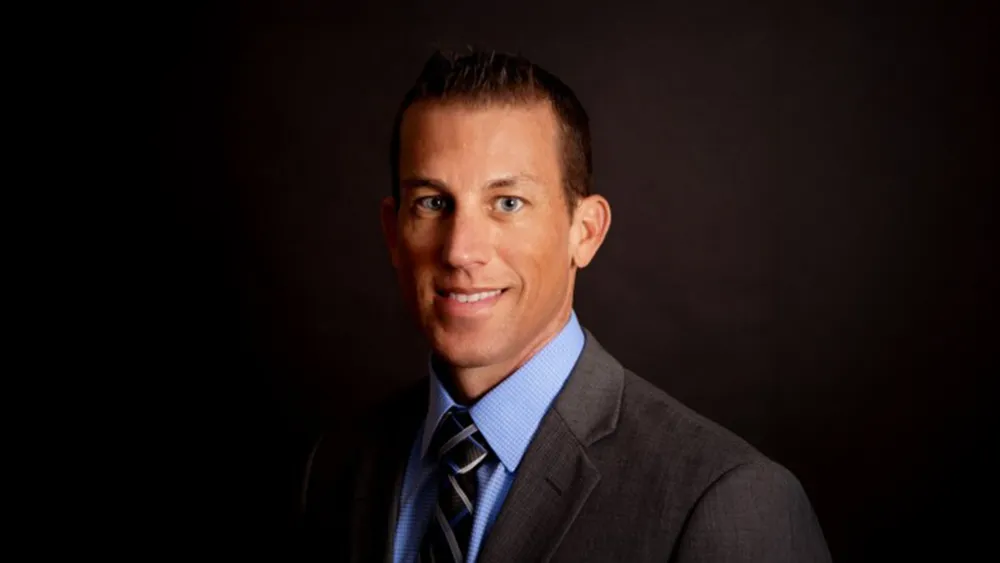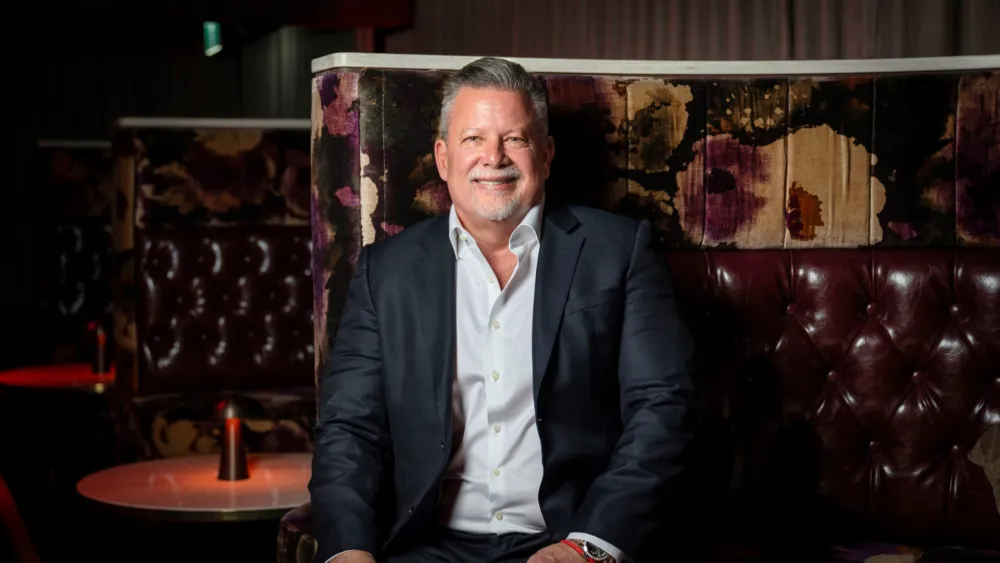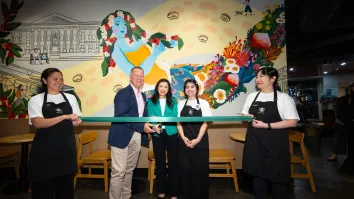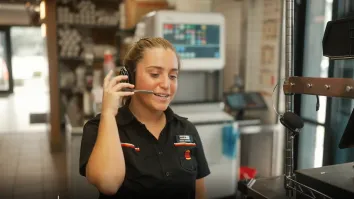
Ferguson Plarre Bakehouses has a growing appetite for plant-based alternatives
Chief executive Steve Plarre also talks about having a resilient franchising model amidst the pandemic, plans for a wholesale channel and the chain’s decision to put him in the forefront of marketing.
Being a family business for over a century, Ferguson Plarre Bakehouses is no stranger to crises.
For Steve Plarre, the bakery chain’s current chief executive officer, this is a form of assurance, as he and brother Mike - also the brand’s general manager of manufacturing - work together to navigate the challenges induced by the pandemic.
“Just knowing that I'm related to someone who got through something that I think is probably, you know, a lot bigger than my way - going through World Wars and those things. And so the first thing is just having the faith...you gotta believe that you can get through,” he told QSR Media in an exclusive interview. “Acknowledging that it might take a really long time and is helpful with our business.”
Steve also draws insights from the period when the Ferguson and the Plarre business were separate, being “friendly competitors” that helped each other with ingredients and recipes during challenging times. The businesses merged in 1980.
“Whether you've got competitors or not, there's always someone you can learn from and sometimes you've got to come together like that and share plenty of information with others,” he said. “It's making sure that you've got genuine peers around you who can support you and you can speak the truth to them without fear of retribution and those kinds of things. I've got that in my family, but I've also got it with my board.”
Like most sectors across the world, a pandemic was not part of Steve’s contingency plan (“For us, it was ‘the bakery might burn down.’ What would we do if that happened?”). And similar to other chains, their business took a big dive in sales when early restrictions took place.
But on average, Steve said, the chain’s store network went back to growth months later, with some stores experiencing up to 40% rise in sales. He attributes this to their “resilient” model, having a range both for immediate and take-home consumption.
“I think everyone realizes that with the global population where it's at, we can and we need to expect that there might be more pandemics,” he warned.
“It's super not niche. It's a bit of everything to everyone. And the safety of our brand over the years means we've been able to jump on little trends without being entirely addicted to that trend, whether it be muffins or donuts, or macaroons, that kind of stuff. But it also means when those trends heat, we don't get the big spikes and the big peaks.”
“We’re in the business of making people happy”
Over the last couple of years, Steve said they have put a focus into understanding their customer archetypes. And amidst the pandemic, they took some time to work on things that would appeal “to what they're going through right now.”
“We reframed the business and made sure we really understood what it was that Ferguson Plarre does in the industry that we're in - and we're in the business of making people happy,” he explained. “We happen to do that for the last 120 years through making great cakes and pies and sausage rolls, but acknowledging that was really key for us.”
This form of customer engagement came in the form of parody covers, crafted by Plarre himself - occasionally done with his wife and two children - and is generally met with positive reactions on their social media platforms. The idea also stemmed from the business opting to spend less marketing when COVID-19 hit.
“The pandemic has us stumble across something we probably should have been doing 10 years ago. Yes, we want to make a pie that makes people happy. But there are other aspects to that customer relationship that we could do a better job of,” he said.
“My marketing team and the rest of the business have said, ‘Look, this is working, you should just do more of it. And we're not going to hire additional talent.’ When we're busy trying to tell customers that we're a family business and still family-owned...what better way than for one of the family [members] who's comfortable in front of the camera to do that stuff?”
Whilst “happy” to do the covers, Steve himself is the first one to back out if the company tells him to do so. Eventually, he would like to see staff replicate this particular form of engagement.
“I'm continually testing with my board and with my franchisees and our customers,” he said. “I really like it but I don't want to be that narcissistic CEO idiot, you know? [...] As long as people like it, as long as it's brand aligned, its values aligned, then I'm happy to do it.”
“There's a lot of talent in the network. And there will be dancers and singers, piano players and I'm dying to put them into our Gala Awards, so that we do like a flash mob when we're allowed to,” he added.
Direct communication with franchisees, maintaining supply chain
In terms of supporting franchisees, Steve said they continue to press on in helping them with rental concerns.
“Banks were quick. Government was quick. Landlords are still, in my opinion, dragging their heels. I mean, the relief that it would give retailers for them to just be clear about giving some sense of comfort around what's going on would have been very helpful,” he surmised.
He himself has sent out videos communicating to franchisees as part of a “high-level empathy” strategy.
“It was a careful balance between trying to be a positive, optimistic CEO, but not so much that they're thinking that the dude is in La La Land,” he said. “I think it helped for them to know that I was trying to be strong, but that I was still human, and it was okay for them.”
Being the sole manufacturer of the products their stores sell, ensuring supply chain remains optimal during this time was also a focus - something that was part of their contingency plan before the pandemic happened.
“We spent the last 12 to 24 months meeting with alternative suppliers of savory and sweet products who could potentially do our range. I'm really thankful that we had done a bit of that work so we very quickly moved to making sure that we had some backup supplies who might have been able to help out, God forbid, our bakery be affected,” he said. “We went very quickly to temperature checking, shift segregation to make sure that if someone did get something that it wouldn't infect the rest of the facility.”
There were even occasions, Steve shared, that the company ran stores on behalf of some of their franchisees that were feeling pressured during this time.
“I'm really confident that in hindsight, or on the other side of COVID-19, both the team and the franchise network are going to see that we stepped up. And we did what we said we could when, you know, when other businesses might not have.”
Larger appetite for plant-based alternatives
The bakery chain recently made headlines for its plant-based, vegan-friendly meat pie and sausage roll, a renewed bid to reach a growing flexitarian market in the country. The chain’s gluten-free beef pie was also launched across their 80-plus stores earlier this month.
Steve, who has switched to a plant-based diet, found confidence that the Australian market was ready for these new products when he saw the overwhelming reception of Greggs’ vegan sausage roll in the United Kingdom. Having a larger plant-based range in their menu, he said, is a certainty.
“I think it’s going to be a lot more than 5% in the long-run. I’d like to say it would be 20 to 30% over the next five years. It’s a lot easier with sweets,” he said, also confirming that they have already crafted plant-based versions of their steak & onion, steak & mushroom, cottage, chicken and lamb pies that they plan to launch.
“Part of this is educating...If we launched with all of this in one hit, then it would be too much in our stores,” he explained.
Wholesale channel for premium savories, predictive ordering solutions
Steve also confirmed they would extend this into a wholesale channel called Pie Society, highlighting premium, vegan savory items. At this stage, they are currently deliberating potential partners for these products, such as restaurants, cafes or supermarkets.
“This is pretty embryonic thinking, but it might be something where people buy the product and they just don’t mention the brand at all or they might like to mention,” he said. “If we were to do any kind of supermarket channels, Pie Society would be the brand.”
Other efforts to further diversify include strengthening partnerships with delivery platforms and potential offering unbaked goods and shipping them across states.
Steve also said the chain looks to provide predictive ordering solutions for their franchisees, which have been utilising Ferguson Plarre’s in-house bespoke app for their ingredients and suppliers. He hopes to have that service by June 2021.
Once aiming to be the biggest cake retailer in the country, Steve said he and his brother Mark now have a different approach to growth, saying they prefer to focus on quality. They are currently in talks with a potential partner in NSW that can handle production solutions.
“If we can emulate the Ferguson Plarre model in another state, we’ll do that,” he said. “We’d love to go faster. But if we can’t, we won’t.”
Steve, like his peers, predicts consolidation within the industry, with some not being able to make it through the pandemic. On their end, the business plans press on and continue to engage customers and their needs as the industry continues its road to a long recovery.
“If we understand that well, then I’m confident that we’ll keep delivering happiness,” he said.


























